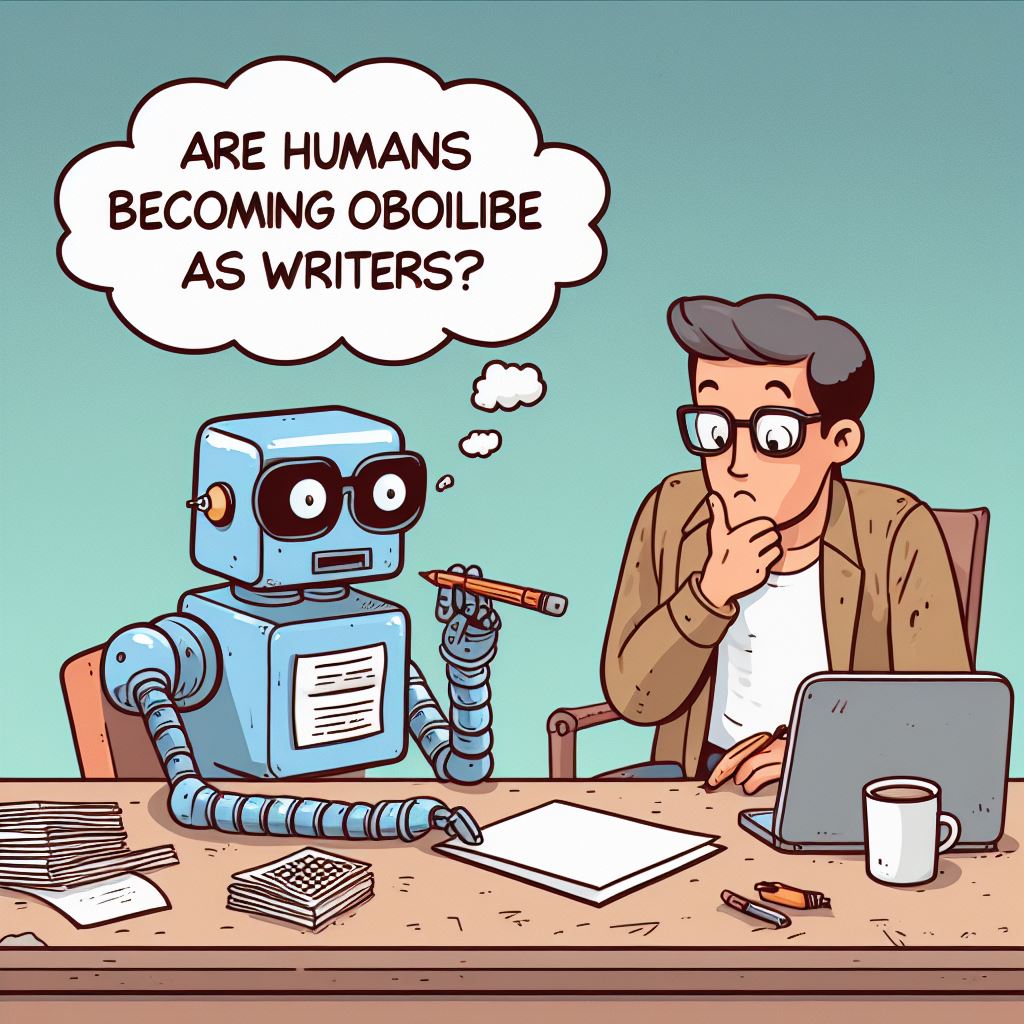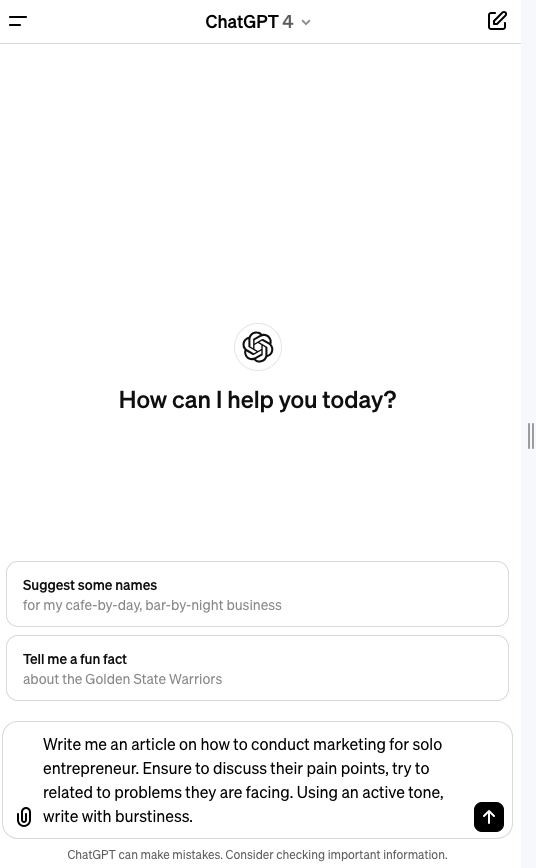
Introduction
Knock, knock. Who’s there? It’s the future of writing – AI writers! And with them comes a whirlwind of questions like are humans becoming obsolete in the writing industry?
What are AI Writers and Human Writers?
AI Writers or Artificial Intelligence writers are advanced software that generate content based on inputted data. They use machine learning algorithms to understand context, grammar, and subject matter. All you need to do is feed them a topic or a few keywords and voila! Your article is ready in seconds.
Human Writers, on the other hand, are us - I, you, anyone who can put pen to paper (or fingers to keyboard) and create content. We research, analyze, empathize, and personalize each word we write, making our articles unique and relatable.
The Rise of AI in Writing
The digital age has seen technology infiltrating all aspects of life, including how we write. As AI gets smarter and faster, their popularity in content creation is skyrocketing.
Are Humans Becoming Obsolete?

With the speed and automation that AI brings to the table, it's easy to see why some might think so. But before we get carried away with these futuristic thoughts, remember this; while AI can simulate human-like writing, it lacks certain qualities that only we possess - empathy, creativity, and the ability to understand complex human emotions.
The Rise of AI Writers

However, AI writers also have their limitations. While they can produce coherent and grammatically correct content, they often lack the human touch
Our world is witnessing a technological revolution, and as part of this digital transformation, we're seeing the rise of AI writers. These are not your typical writers. Instead, they're complex machine learning algorithms that are capable of weaving words together to create informative and engaging content.
So what has fueled the rise of AI writers?
The Capabilities of AI Writers

The primary driving force behind the popularity of AI writers is their capabilities. With an ability to learn from vast amounts of data, these AI-powered tools can mimic human writing styles, churn out blog posts, emails, reports, and even books in a matter of minutes. They can also generate content on a wide range of topics - from technical articles to creative stories - allowing businesses to cater to diverse audience needs.
AI writers also have the ability to work round the clock without breaks or vacations. This means they can produce high volumes of content at any time, making them a reliable resource for businesses that require consistent content output.
Benefits of AI Writers
AI Writers come loaded with several benefits that make them an attractive proposition in the writing industry:
- Speed: AI writers excel in quick content generation. They can analyze data and compose text faster than any human writer could dream of.
- SEO Optimization: There are AI writers built specifically with SEO optimization features , which means they can not only churn out content at lightning speed but also ensure that it is optimized for search engines. This can greatly improve a website's visibility and organic traffic.
- Consistency: AI writers are consistent in tone, style, and quality. Once trained on a particular writing style, they can maintain it throughout their output, ensuring brand consistency across various pieces of content.
- Continuous Learning: AI writers have the ability to continuously learn and improve their writing skills based on user feedback. This means their output gets better over time, resulting in higher quality content.
- Cost-Effectiveness: Investing in an AI writer can be more cost-effective in the long run. You pay for the software once but reap its benefits indefinitely.
It's clear that AI writers offer promising capabilities and significant perks. They're fast, they're efficient, and they're cost-effective.
The Unchanging Value of Human Writers
While the rise of AI writers is undeniable, the value of a Human Writer remains steadfast and irreplaceable in the writing industry. The unique strengths of human writers - personalization, comprehensive research, and creativity - set them apart from even the most advanced AI technology.
Personalized Touch

With an innate understanding of human emotion, human writers bring a personalized touch to their content. They can empathize with their audience, understand their pain points, and write in a way that resonates with them. This emotional quotient often lacks in AI-generated content which can result in mechanical and impersonal communication.
Comprehensive Research
When it comes to in-depth analysis and comprehensive research, human writers take the cake. They have the ability to sift through piles of data, identify credible sources, comprehend complex information and present it in a simplified manner. These skills are essential in industries like academia, journalism, and technical writing where accuracy and depth of information are paramount.
Creativity Unleashed
Arguably one of the most significant traits of a human writer is creativity. Every writer brings a unique perspective and voice to their work, breathing life into words. They have the ability to weave stories that captivate audiences, create vivid descriptions that paint pictures in the mind's eye, and use metaphors that give deeper meaning to concepts. This level of creativity is something that AI has yet to match.
Despite the impressive capabilities of AI writers, these strengths make human writers not just relevant but crucial in the industry. From crafting compelling narratives for novels to creating persuasive copies for marketing campaigns – human writers add an element of authenticity and originality that eludes AI.
This isn't about choosing sides or sparking a "man vs machine" debate. Rather it's about understanding how humans and AI can complement each other's strengths in the writing domain. This harmonious blend of human creativity and AI efficiency may very well be the future of writing.
AI vs. Human Writers: A Comparison

When it comes to content creation, you may find yourself at a crossroads: should you harness the power of AI writers or tap into the creativity of human writers? The decision isn't always clear-cut, as there are several factors to consider.
Factors to Consider
Choosing between AI and human writers involves more than just randomly picking one. Here are some important factors to think about:
- Content Purpose: What is the goal of your content? Is it to educate, entertain, or sell? While AI writers excel at producing data-driven articles, they may struggle with crafting emotionally compelling stories.
- Target Audience: Who are you writing for? If your audience values accuracy and efficiency over originality, AI might be the way to go. However, if they appreciate personalized and creative content, human writers have an advantage.
- Budget: This one is straightforward. If you have budget constraints, AI writers with their cost-effective operation could be an appealing choice.
- Subject Complexity: Complex or specialized topics often require extensive research and deep understanding. While AI can provide quick access to information, human writers with subject matter expertise can deliver more insightful and accurate content.
- Ethical Considerations: Lastly, ethical concerns surrounding AI-generated content are worth considering. Plagiarism, biased algorithms, and the potential for misuse are all valid concerns that may tilt the scales in favor of human writers.
Individual or Business Preferences
Personal preference or business needs also play a significant role in this discussion. For example:
- Businesses that operate on tight schedules may prefer AI's speed and precision in generating large quantities of content quickly.
- On the other hand, individual bloggers or creative agencies might lean towards human writers for their ability to infuse passion and emotion into their work.
Speed and Accuracy vs Creativity and Personalization
AI has revolutionized how fast we can create content. It's like having a team of tireless writers who produce top-notch SEO-friendly articles in no time. However, while AI shines in terms of speed and accuracy, it often struggles with originality and personal touch - areas where human writers excel.
Human writers bring a unique perspective to each piece they write, incorporating their insights, feelings, and personal experiences that AI simply cannot replicate. Their knack for understanding subtle nuances and adapting their writing style to evoke specific reactions is a talent AI has yet to master.
The ongoing debate of 'speed and accuracy' vs 'creativity and personalization' is akin to comparing apples and oranges. Both have their place and serve different purposes in the realm of content creation. The key is knowing when to utilize each one.
So, whether you opt for an AI writer with its unwavering precision or a human writer with their imaginative skills, it ultimately depends on your specific requirements.
Keep in mind, the objective isn't just to produce content; it's about crafting meaningful content that resonates with your readers.
Testing AI and Human Writers
A crucial step in understanding the capabilities of both AI and human writers lies in testing. It's all about getting hands-on experience and seeing firsthand what each one can deliver.
The Importance of Testing
Just think of it as a tech test drive. You wouldn't buy a new car without taking it for a spin, would you? The same applies to writing. By testing out AI and human writers, you can better understand their strengths, weaknesses, and overall fit for your needs.
Understanding Capabilities
Testing isn't just about proving who or what is better—it's about understanding capabilities. In doing so, we can determine where humans shine brightest and where AI can offer significant advantages.
Top AI Tools and Platforms
There are several top AI tools and platforms that can transform your writing process. These innovative tools have been created to make content creation simpler, quicker, and more effective.
1. Junia AI
This AI writer for longer pieces stands out from the rest. Junia AI is exceptionally skilled at generating top-notch content that is well-organized, logical, and captivating. It's like having your own personal writing assistant who never takes a break!
2. WriteSonic
WriteSonic is another fantastic tool in the realm of AI writing. It's an advanced AI-driven copywriter that can create anything from blog posts to ad copies and product descriptions. Additionally, it offers support for multiple languages, making it a favorite among businesses worldwide.
3. Copy.AI
If you need an AI tool that can produce marketing copies quickly, then Copy.AI is the platform for you. It utilizes GPT-3.5 technology to generate imaginative copies that are guaranteed to grab your audience's attention.
4. Rytr
Rytr is an AI writing tool that promises to improve your content creation journey. With Rytr, you can generate high-quality content in various formats including emails, blogs, social media posts, and more.
5. Jasper.AI
Jasper.AI excels at creating longer pieces such as blog posts or reports. It also provides features like optimizing keywords and varying sentence length to ensure your content is search engine-friendly.
6. Surfer SEO
For those who take search engine optimization seriously, Surfer SEO is the ideal option. This platform offers comprehensive analysis on keyword usage, word count, page structure, and more to help you craft perfectly optimized content.
These powerful tools can enhance your writing process, making it both more efficient and enjoyable. Each tool has its own unique features that cater to different needs, so you can find the perfect fit for your specific requirements.
It's important to remember that these tools are not meant to replace human writers but to act as assistants, augmenting our abilities and allowing us to concentrate on the more creative and nuanced aspects of writing. So whether you're an experienced writer or just starting out, these AI platforms are worth exploring to elevate your writing skills.
AI as a Helpful Assistant for Writers
Imagine being on a huge construction site with only a hammer and some nails. It's a difficult task. Now imagine being in the same situation, but this time you have advanced machinery and tools that make the job not just easier, but also more accurate and efficient. That's how it feels when writers start using AI tools.
AI is not just changing the writing industry – it's completely transforming how we create our words and tell our stories. From bloggers to novelists, from journalists to marketing professionals, everyone in the writing world can benefit from these advancements.
GPT-4: The Super-Powered Language Model
Meet GPT-4, one of the most impressive language prediction models ever made. Created by OpenAI, this tool can understand context, generate text that sounds like it was written by a human, and even translate languages! It's like having an amazingly talented writing assistant who is available 24/7.
GPT-4 analyzes a piece of text, understands what it's about, and helps generate content that fits with it. The result? A smooth flow of information that keeps readers interested and informed.
Improving Writing Quality with AI
AI-powered writing assistants do more than just fix mistakes – they enhance the overall quality of your writing. Here are some ways they can help:
- Grammar: Tools like Grammarly use AI to find and correct grammatical errors as you write.
- Spelling: AI isn't only about catching spelling mistakes – it predicts words based on how you type, making writing faster and more effortless.
- Sentence Flow: AI can suggest changes to improve the way your sentences connect with each other, making your content more engaging.
- Organization: AI can assist in structuring your content for better readability.
AI-powered Multilingual Translation
AI can help you reach a global audience by quickly translating your content into different languages. This functionality opens up avenues for writers to communicate their ideas to a diverse audience without the constraints of language barriers.
But how does this fare against human translators or writers?
Speed and Efficiency
AI translation tools can process lengthy documents in a fraction of the time it would take a human translator. This speed and efficiency make AI translators ideal for businesses that need quick translations on a large scale.
Consistency
With AI, there is less likelihood of inconsistency in translating specific terms or phrases. AI algorithms ensure that the same term is interpreted and translated uniformly across multiple instances, preserving the integrity of the original content.
Cost-Effectiveness
Hiring professional translators can be costly, especially when dealing with multiple languages. AI provides an affordable alternative, making multilingual content accessible even to small businesses or individual writers.
Wide Language Coverage
AI translators are programmed to understand and translate numerous languages — often far more than any human translator could handle efficiently.
However, it’s important to remember that while AI has its strengths, human writers still hold an edge in areas where AI falls short.
Accuracy in Contextual Understanding
While AI can translate words and phrases accurately, it may struggle with nuanced cultural expressions or idioms that a human translator would understand easily.
Emotional Intelligence
Language isn’t just about words — it's about expressing emotions, too. Human translators can infuse empathy into their translations, something that AI still cannot replicate as effectively.
Boosting Creativity with AI
But AI's capabilities extend beyond fixing grammar and spelling. AI writing tools can:
- Find the perfect synonym to make your writing more varied and interesting.
- Suggest expressive phrases that add flair to your content.
- Inspire you with topic ideas when you're feeling stuck.
- Analyze how readers feel about your content and offer suggestions to improve it.
So, is AI replacing human writers? Absolutely not. It's giving them a powerful set of tools that enhance their skills and assist them in communicating more effectively. It's about using technology to amplify human creativity, not eliminate it.
Why Humans Can't Be Replaced
While AI's rapid advancement is impressive, it's essential to remember that, at least for now, AI and humans complement each other rather than compete. There are certain aspects of writing where humans truly shine and demonstrate their irreplaceability. Let's explore some of these invaluable human traits.
Variation
Human writers effortlessly provide a unique perspective on topics, creating content that varies in style, tone, and viewpoints. This variability adds richness to the content landscape that is difficult for AI to replicate.
Empathy
Empathy is a distinctly human trait that allows us to connect on a deeper emotional level, something an AI writer might struggle with. Human writers can tap into their experiences and emotions to create content that resonates with readers, evoking feelings that can drive engagement and response.
Creativity
While AI can be programmed to 'create', this creation is based on existing data patterns. The ability to think outside the box, imagine new concepts or narratives, and innovate is a characteristic strength of human writers.
Passion
A human writer's passion can shine through their work, giving it a special spark that engages readers. This passion often drives writers to delve into topics deeply, adding layers of depth and insight that an AI might miss.
Judgment
Critical thinking and judgment are key to producing high-quality content. Human writers can discern relevance, critique ideas, anticipate reader responses, and make necessary adjustments – skills yet to be mastered by AI.
Experience
Life experience provides a wealth of knowledge and understanding that contributes significantly to writing quality. An AI can process data but lacks lived experiences which often serve as the backbone for compelling storytelling.
So while we embrace the assistance of AI in the writing industry, let's not forget the unique human touch we bring to the table. As we continue our exploration into this fascinating topic in the next section, remember - AI and human writers can work together harmoniously, each offering their unique strengths to create a truly comprehensive writing solution.
The Perfect Combination: AI and Human Writers
To succeed in the writing industry today, it's important to grasp the role of both AI and human writers. When used together, they can create a powerful combination that brings out the best in each.
The Benefits of AI Writers
AI tools have several advantages that make them valuable assets in content creation:
- Speed & Efficiency: AI writers are incredibly fast and accurate. They don't get tired or take breaks, so they can work around the clock without any drop in quality.
- SEO Optimization: Thanks to their ability to learn from data, AI writers can keep up with SEO trends, such as Google's algorithm updates. This ensures that your content consistently ranks well in search engine results.
- Cost-effectiveness: Hiring full-time writers can be expensive, especially for businesses with high content demands. In comparison, using AI tools can be a more budget-friendly option.
The Strengths of Human Writers
While AI writers have their merits, human writers bring something unique to the table:
- Creativity & Personalization: Humans have a natural knack for thinking outside the box, coming up with original ideas, and injecting personality into their writing. This can enhance reader engagement and make the content more relatable.
- Critical Thinking: Human writers excel at analyzing complex situations, spotting patterns and subtleties, and drawing insightful conclusions. This adds depth and sophistication to the writing.
- Understanding Nuance: Humans are skilled at handling variations in tone, style, and context – an area where AI still has room to improve.
Striking the Right Balance
In an ideal scenario, businesses and individuals should leverage both AI and human writers in a complementary manner:
- Divide & Conquer: Let AI take care of generating large amounts of SEO-driven content such as blog posts or product descriptions. Its speed and accuracy make it perfect for this task.
- Unleash Creativity: Assign more creative and thought-provoking writing projects to human writers. This could include crafting editorials, telling engaging stories, or sharing personal experiences.
- Collaborate & Polish: Encourage collaboration between AI and human writers using tools like Junia's AI Text Editor. Use AI-generated drafts as starting points and let human writers add their creative flair, critical analysis, and nuanced understanding to refine the content.
By adopting this hybrid approach, businesses can benefit from the efficiency of AI and the artistry of human writers. This synergy between technology and human creativity has the potential to revolutionize the field of content creation.
Conclusion
In the vast landscape of AI writers vs human writers, we've explored an interesting journey.
AI writers have made great progress, yet human writers still have their special appeal. As we move forward, it's clear that this is not the end, but a fresh beginning. The next part of our story is waiting for us - a world where AI and humans don't fight but work together in the writing field. Let's create that future side by side.
